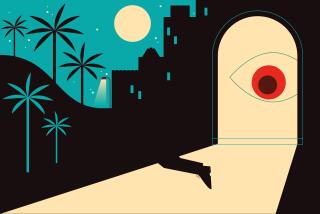Michael Cho’s graphic novel ‘Shoplifter’: Adrift in the city
There’s a lot of Adriane Tomine in Michael Cho’s first graphic novel “Shoplifter” (Pantheon: 96 pp., $19.95), and a bit of David Mazzucchelli, as well. By saying this, I’m not suggesting that Cho is derivative, just that he is operating out of a tradition, a way of thinking about, and working in, the comics form.
Like Tomine, his territory is that of the contemporary urban dweller: educated, disaffected, vaguely arty, longing for a meaning that doesn’t always assert itself. Like Mazzucchelli, he likes to work with two-color illustration, in this case using black and pink.
“Shoplifter,” however, is all his own, the story of Corinna Park, five years out of college, an aspiring writer working at a big-city advertising agency. To say Corinna is lost is an understatement; she is in full-on drift mode, disengaged from work, life, everything.
Early in the novel, she stuns a meeting, looking for a tag line with which to sell perfume to young girls. “How about ‘Daddy says I smell special’?” she suggests — and in the shocked reaction of her colleagues, Cho deftly evokes the hypocrisies of marketing and media, which play along the edges of the appropriate without ever acknowledging that this is so.
Here we see Corinna’s world, or, more accurately, the world she is resisting: a world of clubs and come-ons, promotions and one-night stands. To resist, she stays at home with her cat Anais, who hates her, while stealing magazines from the local convenience store.
It’s a meaningless act of rebellion, which is entirely the point. How does Corinna rebel against a culture of consumption that is itself all-consuming, that eats up everything — our creativity, our data, our inspiration — as part of a never-ending commodity exchange.
“Can you believe these guys?” a photographer named Ben asks her at a corporate party, as a band promotes the sponsor from the stage. “I actually own some of their CDs. Now they’re just … pitchmen.” This is what happens, “Shoplifter” implies, when we give up art for commerce, or allow commerce to become our art.
And yet, not even art is pure here, since Ben turns out to be just another guy working the party, going home with someone else.
Cho is a subtle storyteller, setting “Shoplifter” in a city reminiscent of Toronto, although it remains unnamed. As in his previous book, “Back Alleys and Urban Landscapes,” the city becomes something of a character, lonely but also full of possibility. This, along with his at times sparing use of language, gives the graphic novel an air of quiet desperation, of a decision about to be made.
“I wonder how much of that is just something I’ve seen in a movie,” Corinna reflects, thinking about her own longing, which is really a desire for connection, for engagement, for the ability to immerse in something bigger than another day of useless work. “Still, I’d love to be able to do it. Just give it all up and start another life somewhere. To be someone new. Somewhere new.”
Twitter: @davidulin
More to Read
Sign up for our Book Club newsletter
Get the latest news, events and more from the Los Angeles Times Book Club, and help us get L.A. reading and talking.
You may occasionally receive promotional content from the Los Angeles Times.







